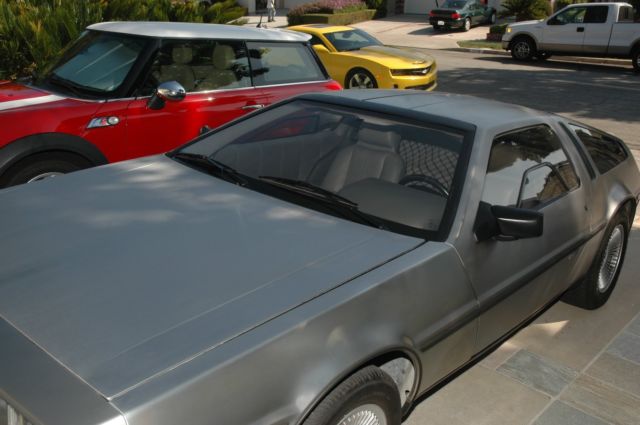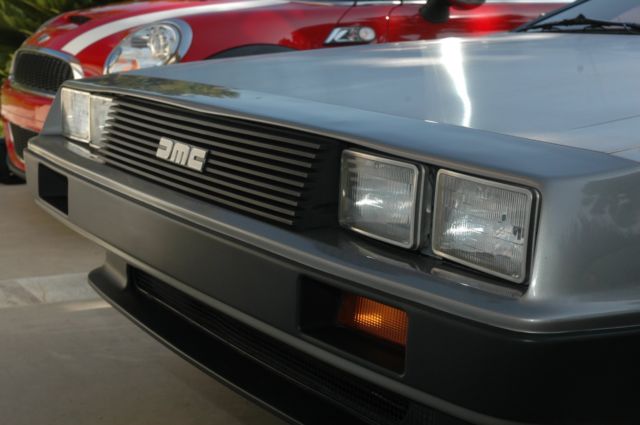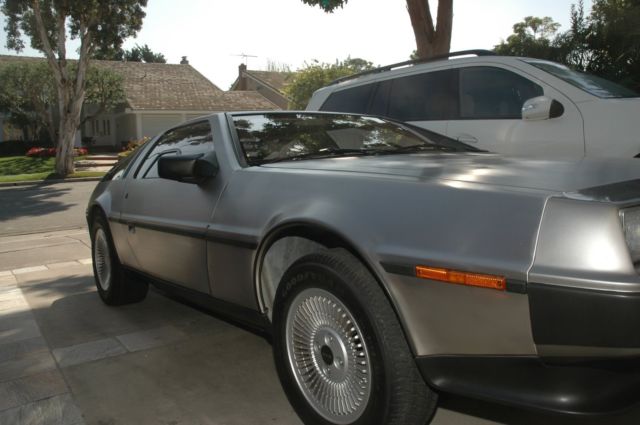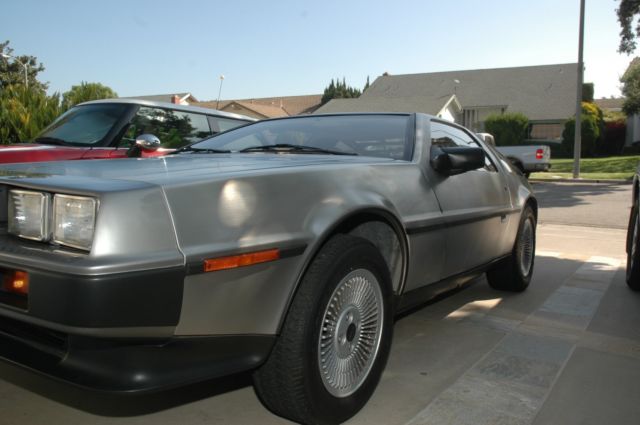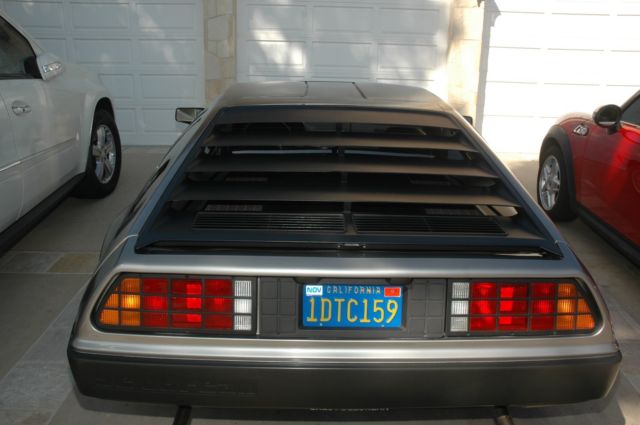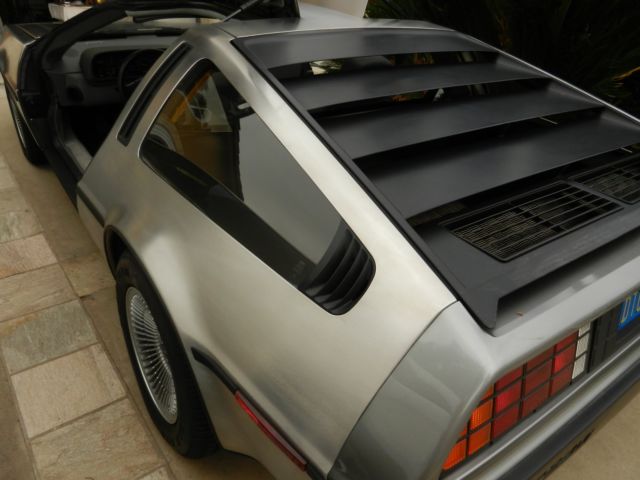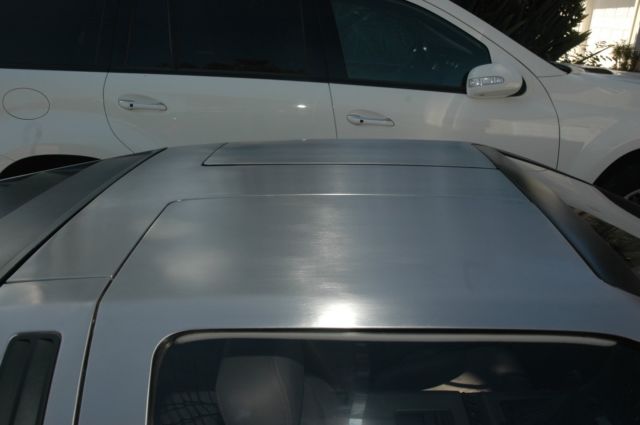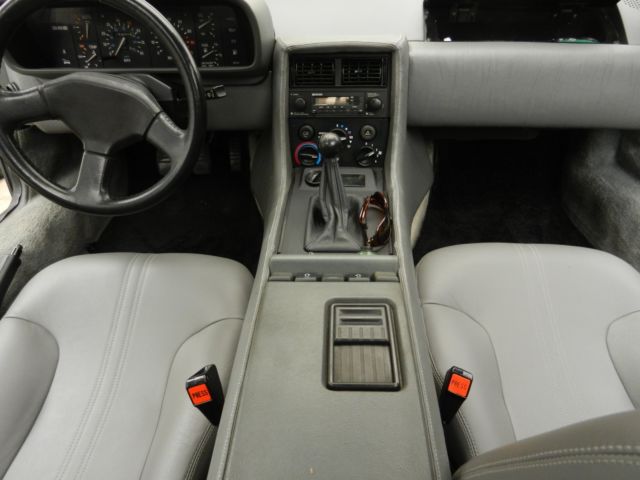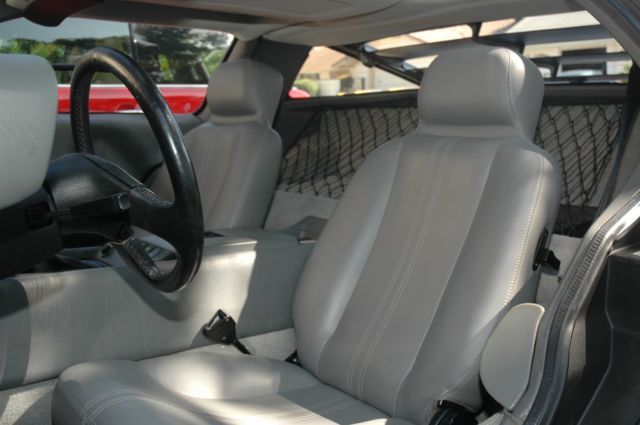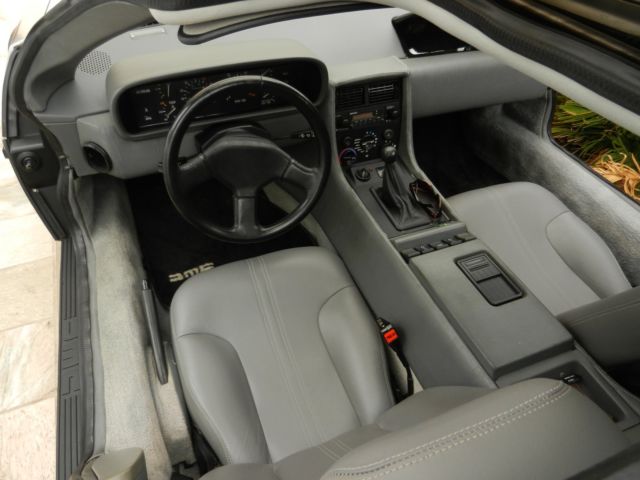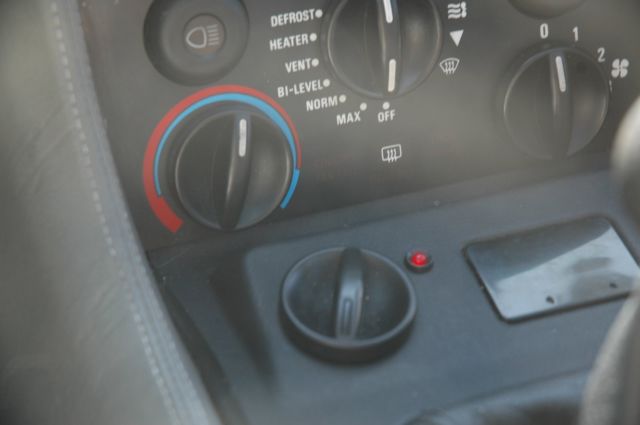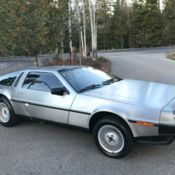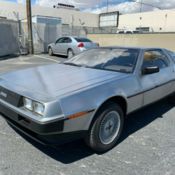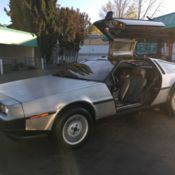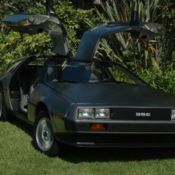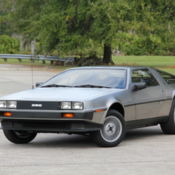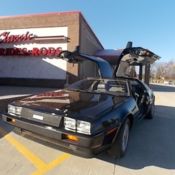1981 DELOREAN, original owner - Blond Not Included!
| Condition: | Used |
| Make: | DeLorean |
| Model: | DMC-12 |
| Type: | Coupe |
| Trim: | Gray |
| Doors: | 2 |
| Year: | 1981 |
| Mileage: | 45,000 |
| VIN: | SCEDT26T8BD004336 |
| Color: | Silver |
| Engine: | 2,849 cc PRV V6 |
| Cylinders: | 6 |
| Fuel: | Gasoline |
| Transmission: | Manual |
| Drive type: | RWD |
| Drivetrain: | RWD |
| Interior color: | Gray |
| Drive side: | Left-hand drive |
| Vehicle Title: | Clear |
| Item location: | Newport Beach, California, United States |
| Extras |
| Listed by | Private seller |
Description of 1981 DeLorean DMC-12 Gray |
|
(more pictures in listing posted onHemmings.com) Live the Dream, with all the trimmings, and then some… For those of you that think the early DeLoreans are somehow special, I was there at the beginning, and no, they are not, rather they are all ‘prototypes’. Any car with black interior and a gas cap door in the hood is referred to metaphorically as an ‘oldie but goodie’, nice to look at, but don’t buy one. As the car matured, the gas cap door went away, and the more stylish gray interior was introduced. Some vehicles have received more love than others, but likely none more than this one. It may sound romantic to get a car with only 700 miles on it, but only if you want to put it in a museum. On the other hand, if you want to drive it and enjoy it, best to get one that has received all the service an upgrades. It is a very long list, and if you are not a car person, and just looking for a DeLorean to own a piece of automotive history, maybe just skip this narrative. Even midway into production, as this vehicle was (4338 out of approx. 9000 total produced in year 1), much of the car was still untested, and unproven. Arguably, better than new … Cooling System The original radiator was a metal core, with plastic side tanks. (a really bad idea). Additionally, the overflow/filler bottle was plastic, which was known to develop leaks. Additionally, the nature of the engine is to cycle hot fluid back into the filler bottle as it cools, and suck it back into the engine as it warms up, however, in practice, the vehicle would expel too much fluid causing overflow, and then be low on coolant. Lastly, the radiator being at the front and the engine at the back means a long run of water hoses from to and from, and to the heater via the center channel, seemingly routed by a rube Goldberg wannabe. Solution: Upgrade to all metal radiator; Upgrade overflow bottle to stainless steel; add additional overflow container of sufficient size to capture routine overflow and prevent engine from losing any coolant. Change all auto-grade water hose to marine-quality, reinforced green-stipe, and all hose clamps to marine quality stainless steel. Design, build and mount a custom stainless steel manifold to collect and cleanly route the 3 converging water hoses where they intersect at the top of the transmission, and route all hoses neatly with fasteners to prevent chafing at contact points. But wait, there’s more. The vehicle is prone to overheating if the fan relays failed, as they were sure to do. As overheating an aluminum engine is never a good thing, installing an aftermarket ‘Fanzilla’ module was the fix to avoid this issue. Done. Fuel Filter Just a standard AC-Delco fuel filter, but not so cleverly, and very inconveniently, mounted under the engine near the transmission at the junction of the rear wishbone assembly on the driver side. Solution: Splice the fuel line with aircraft-grade flare fittings, extend and route to driver’s side wall of engine compartment, and fit ends with banjo fittings for easy access, inspection and maintenance. Done. Road and Engine Noise The cabin of the DeLorean is molded fiberglass and has virtually no sound insulation from road or engine noise. Solution: Remove the entire interior (seats, console, carpet) and line with marine-quality foam with 2 layers of acoustical foam, bonded to a septum barrier, then reassemble, with the result being, the quietest DeLorean on the planet. Once again, you can have a conversation at normal volume, listen to the music, and enjoy the ride :-) Done. Electrical For the most part, DeLorean wiring is above average, and trouble free, except for that one small problem that causes the fuse block to melt. The problem turns out to be a genuine design error in that there is a 16 ga supply-side wire feeding a 12 ga demand side. Result is certain failure. Open any DeLorean fuse compartment and this is an obvious problem. Solution, replace the supply wire with proper gauge, and replace the fuse block, but wait … that means disconnecting every wire in the car. Yup. Solution, in multiple parts. Obtain a wiring diagram, and a set of colored pens. Trace and color code every circuit on the car, laminate the one-and-only color electrical schematic for posterity. Replace undersized wire with matching color and correct gauge. Purchase new fuse block, remove old fuse block and all electrical connections … discard both the old and new fuse block and go to the drawing board to design and fabricate a stainless steel circuit breaker panel; then purchase a generous assortment of circuit breakers. Circuit by circuit, route all wires from the fuse block, to a circuit breaker of matching size, tracing each wire on the car against the schematic. Oops, no brake lights, where are the brake lights? Search the entire care, find an inline fuse under the dash binnacle, route and extend with correct color and gauge to the new circuit breaker panel. Disconnect all circuits one by one and route though shunt to measure actual current draw to determine correct breaker size for each circuit (and no, larger is not better, rather, correct is better). Install, document, and label panel, re-route all relays move to make room. Result, the only DeLorean on the planet with circuit breakers. “where we are going we don’t need fuses” But wait there’s more. Of course there is. The DeLorean has door switches to activate the door lights and probably due to an engineering failure, or just a quick fix to use a stock part, they are too short. To solve that problem the factory pushed on a little rubber boot that makes them just long enough to close the circuit. So to avoid the doors are closed but the lights are on dead battery syndrome, add a hidden rocker switch that allows you to turn off the door lights. But wait there’s still more. Because you can’t get out the window if for some reason your doors will not unlock there is an impact switch (I believe mounted under driver side front fender that will unlock the doors in the event of an impact. I am told you can whack your fender and the doors will unlock, although, I have never known anybody to try it. The downside is that this circuit stays powered up even when the key is off. Solution, add to double-throw rocker switch so it can be manually turned off. And, while we have the everything opened up, now would be a good time to install a kill switch, so install another hidden rocker switch, add a red LED to the console so that you know that your car won’t start (lol), and simultaneously provide a visual deterrent so other folks will think that it has an alarm; Route the correct color and gauge wire to ground out the coil. Result. No way to hot wire without knowing that you need to supply power to the coil, and no change to the wiring harness. Virtually undetectable, and works like a charm. And lastly, just because we tend to store our collectables, and those sealed, deep-cycle marine batteries are expensive, let’s run some new marine grade battery cable and install a marine-grade battery switch (in the battery compartment) so we can completely isolate the battery from the car. Result, no battery drain, and car always starts even after long periods of storage. Done. Rock solid and ready to rumble. Engine Overall, a well behaving and dependable power plant, albeit, the engine compartment is criss-crossed with wires and hoses, as if assembled by a spider with ADS. But it works, so who cares. We all know that big D used a modified Peugeot-Renault-Volvo (PRV) - mostly Volvo, but do you know that to accomplish his goal of changing what was a normally aspirated (carbureted) engine into a fuel injected engine that they designed a new intake manifold that (drum roll, please) covers rubber water circulation hoses inbound from the water pump. So, when you see that water leaking out from between your heads, it is likely not the water pump, but rather the water hoses leaking under the manifold, which is inconveniently under all the fuel lines, electrical wires, and the water and vacuum hoses. Book time to change the hoses should be 15 minutes, but is 5 hours. Solution, once again, in many parts. Extend, and neatly re-route all vacuum hoses around engine compartment sidewalls, fastening as you go with rubber-lined, stainless, harness clamps; (as you may recall, the water hoses were already re-routed as part of the coolant system project); extend and re-route all electrical wires, into new modified harness that can be routed around the engine compartment sidewalls, also fastened by rubber-lined, stainless, harness clamps. Source and fabricate longer, wire-braided fuel lines and neatly route down each side of manifold. Remove and replace auto-grade water hose with marine-quality green stripe, and marine-quality, stainless hose clamps, and store some extras in the car just because.. Result: In addition to the best looking DeLorean engine compartment on the planet, the intake manifold can be unbolted and lifted in-place without disconnecting any wires, cables, or hoses, and the valley pan inspected, and or water hoses changed in 30 minutes flat. Done. Lastly, it was determined that troubleshooting a cold start issue was not as straightforward as you might like. Solution: Add an in-line fuel pressure gauge and mount it to the engine compartment back wall, so there is never any guess as to whether the problem is fuel or electrical. And let’s add manual switch to the engine compartment light, so it does not have to be on and draining the battery when the engine lid is up… Other work was just maintenance, e.g., the stock alternator was not powerful enough and needed to be upgraded, and r-12 was phased out in the mid 90’s requiring an a/c compressor change (but I still have the original, if you want it …) Interior Even though always garaged and covered when out (using a custom windshield cover) this vehicle was used and enjoyed as a daily driver for several years, and that sun exposure took its toll on the dash and seats, which was not the best quality leather to start with. Solution: About a decade after the car was retired from daily use, the interior was refurbished with new dash, binnacle, headliner, and the seats reupholstered. Beautiful, it is. Windshield antenna To keep the lines clean DeLorean tried a windshield antenna, which was a nice idea at the time, but just did not work. The original factory solution was to drill a hole in the right front fender and install a ‘stick’ antenna … like that was going to happen. After which, for a time, the factory installed right front fenders have antenna holes. The solution eventually became a rear mounted power antenna, which could be retrofit into the earlier cars. Works nice. A hidden antenna, that only comes up when you turn on the radio. Service Records Purchased new, original owner. All service on this vehicle is well documented, and is substantial. Here in Orange County (California), we were lucky in that regard. The DeLorean prep plant was literally right down the street. All the cars inbound to the west coast cycled through before landing at a dealership, and all the factory-trained technicians lived in the neighborhood. When DMC went under, the techs were quickly scooped up, originally by Volvo shops, but as time passed, they eventually went out on their own and formed local DeLorean only shops. Certainly uncharacteristic of a privately owned vehicle, the maintenance of this vehicle was sponsored by the selling dealer. Yes, there is a story there, but the bottom line is that no-questions asked, fully maintained without consideration of cost or effort. This vehicle has been meticulously maintained, and the records prove it. Dealership Records Here is something you do not find every day. The complete dealership file of the DeLorean dealer that sold the vehicle. Starting in August 1977 with the Dealer and Subscription Application; including the (2) stock prospectus (1977, 1979); the Direct Dealer Sales Agreement, and all ensuing written correspondence between DeLorean Motor Company and the dealership, and sales brochures. Plus, the original Shop Manual, Parts Manual, and Parts Price List, and … the 1978 Industrial Investment in Northern Ireland solicitation from the Northern Ireland Dept of Commerce. Memorabilia and spare parts All factory paperwork has been retained, including window sticker; And there is a collection of early brochures, magazine and newspaper articles; And many published volumes from the original DeLorean Motor Club; And the original poster from the ad agency that won the contract only to have it vanish the following week (DeLorean, The Production Years 1981-1981). The stack of documentation is a foot high. There is also an inventory of spare parts in the car, belts, filters, hoses, blades, and some things thought hard to source if you were away from home, e.g., a spare engine computer. At asking price, winner takes all. If negotiated, all extras are … extra. Service History Overview A quick scan of the service receipts, excluding all routine maintenance items, e.g., tires, brakes, belts, hoses, blades, fluids, struts, battery, scope and adjust, etc. … of the 139 pages I count in the service file… 11.20.81 Delivery date 12.22.81 Replace ign sw, visor, glove box latch, wiper and horn sw 03.08.82 Replace dome light sw; loose bolt found in drivers door 06.08.82 driver seat back; leaking radiator; hood release; 08.04.82 door seals’; brg replaced per bulletin 530102.0 10.15.82 rt door lock solenoid; replace tach; inertia sw 06.12.82 oil pres sender; door torsion; both window tubes 01.17.83 oil sender; speedo drive 03.26.83 fan fail relay; idle micro sw; rt door solenoid 08.26.83 oxygen sensor; valve cover gasket; reroute clutch line 09.26.83 clutch, pressure plate; ac pulley brg; window tubes 03.13.84 ac panel lights; coolant tank; heater fan; temp sw 10.24.84 ac module 07.19.85 pass door solenoid; lf steering boot 03.03.86 metal radiator; door torsion; upgrade clutch cbl; headlight sw 05.12.86 coil 12.17.86 automatic antenna 05.20.87 clutch slave cylinder 03.02.88 exhaust manifold gskts; oil sw; headlight sw 04.26.89 water pump and pulley 08.17.89 driver window motor 09.18.89 fuel pump 11.06.89 visors; fan and motor assy 11.10.89 clutch; rear main seal 02.15.90 vac delay valve; therm vac sw 07.11.90 ft dampner 08.28.90 idle speed regulator 08.13.90 headliner 05.06.91 alternator 05.21.91 regulator 10.01.91 dash interior 05.10.93 circuit breakers 12.22.99 dash, binnacle, glove box lid; windshield; ac compressor; ft fans; 01.06.00 braided fuel hose; water pump, thermostat; reupholster seats 02.02.00 r&r headliner, reseal roof; refinish ft/rr fascia; all injectors, brk lt boards Beyond 2000 car was not actively driven, as such, service is just fluids. |
 Home
Home Contact us
Contact us NEWEST CARS
NEWEST CARS SELL YOUR CAR
SELL YOUR CAR FAQ
FAQ

